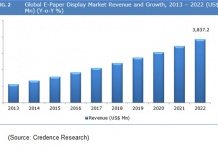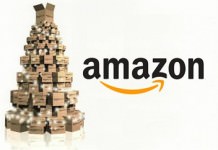 I can’t even begin to count the number of articles I’ve seen over the past few weeks about the swiftly growing popularity of tablet computers. A week or two after the holiday season has ended, I suspect we’ll start seeing solid proof—one way or the other—in the form of sales numbers, and we’ll finally have a firm understanding of just how many tablet PCs are out there in the world today.
I can’t even begin to count the number of articles I’ve seen over the past few weeks about the swiftly growing popularity of tablet computers. A week or two after the holiday season has ended, I suspect we’ll start seeing solid proof—one way or the other—in the form of sales numbers, and we’ll finally have a firm understanding of just how many tablet PCs are out there in the world today.
That’ll be an interesting and even important economic factoid for the digital reading community, of course. Because as we’ve been reminded of over and over again, this particular consumer trend—the suddenly massive popularity of tablets—is having the effect of leading dedicated e-reading devices directly down the road to extinction.
According to a December 20 article on the New York Times‘ Bits blog, though, a number of research firms and market analysts have already begun supplying 2012 sales numbers of tablets and e-readers.
From the article:
The research firm the International Data Corporation found a surge in shipments this year of what it called “smart connected devices,” including tablets, smartphones and PCs. That market grew 27.1 percent from last year, to 303.6 million shipments, according to IDC.
Meanwhile, e-book readers are losing momentum. This year, worldwide shipments of e-book readers will fall to 14.9 million units from 23.2 million units last year — a 36 percent drop, according to estimates by IHS iSuppli.
The Bits blog article also mentions a recently-published report, put out by a research firm known as eMarketer, that mentions those very same consumer trends. Other research firms that have noticed (and noted) the simultaneous decline in e-reader sales and the growth of tablet sales—in the United States, at least—include Forrester Research, which predicts that only 5.3 million e-readers will be sold in 2014, down from 15.5 million in 2011.
Of course, none of this will come as too much of a surprise to anyone who regularly follows the digital publishing industry, where the growth of smartphone reading and tablet reading have both been well documented for some time now. Clearly, the e-reader is on its way out as a growth device.
Although as Paid Content’s Robert Andrews has rightly pointed out, one major explanation for the current slow growth in e-reader sales has to do with the fact that most owners of e-readers have little reason to upgrade to a different (or “better”) e-reading device. In other words, most everyone who wants a dedicated e-reader already has one, and many of those people are perfectly content with their current e-reader model.
* * *
At any rate, here’s my prediction for 2013: This is the year we’re finally going to see Jeff Bezos and Friends giving away the entry-level Kindle Special Offers e-reader for free—or for something mighty close to free—in the hopes that more and more content consumers will find their way into Amazon’s media ecosystem before finding their way into anyone else’s.
Mark my words: By summer or fall of 2013, the entry-level Kindle will be added as a free incentive to some sort of Amazon subscription service.
* * *
Merry Christmas and Happy Holidays, everyone. And may a tablet, e-reader, smartphone, laptop, ultrabook—or even a regular ol’ printed book—find its way under your tree today. (And let us know what you got, will you?) We’ll see you tomorrow.


































If you are a person who has loved to read all their life then you can’t beat a simple dedicated eReader. It’s the modern equivalent of the cheap paperbacks that I carried with me constantly as a kid.
But few people are dedicated and focused readers. When I was a kid I can’t remember a single other kid who constantly carried a book for reading pleasure like I did. So, tablets actually make more sense for most people since they are so much more flexible.
We are looking at at a tablet-centric future world. Tablets won’t just reduce eReaders to a niche product; they will also start taking a big bite out of the desktop computer market. The newer tablets are amazingly powerful little handheld computers in their own right.
Media pundits tend to be fad-crazed. Everything is either ‘the coming thing’ or dying. I remember when they thought that Apple was doomed.
I can’t imagine e-readers going away. My Kindle 3 is marvelous, far lighter and with a much longer battery life than my iPad. It fills a quite useful niche in my life and, like you noted, it’s not something I’ll need to upgrade anytime soon.
I do think that it’d help if the prices came down to the $49.95 range, so there’d be even less of ‘that tablet is only a little more’ temptation. It’d also help if:
* Amazon decides that subsidies make sense, particularly since no one expects an e-reader to get ebooks from multiple vendors. Dedicated devices do make sense, particularly as a way to read that works well outdoors. Who wants to sit in a dark room all the time?
* Someone creates an e-reader that could be configured to work with a particular public library system. The libraries could sell them at cost, and make money on the savings from converting more customers to digital.
* Someone might also create an ebook club. Each month members get their choice of a certain number of ebooks in the categories they’ve chosen. And once purchased, the ebook would be yours as long as you remain a member and without storing it on your device. That should be popular with people who read a lot of novels. And with no shipping costs, prices could be low.
@Michael W. Perry: “Media pundits tend to be fad-crazed. Everything is either ‘the coming thing’ or dying. I remember when they thought that Apple was doomed.”
Media pundits have been declaring (still!) that Apple was doomed for at least the last 2 decades. They’ve been wrong every time. Media pundits get paid to make outlandish pronouncements that generate clicks/advertising dollars. Just like technology/financial consultants do their best to make predictions to raise/lower stock prices so their firms can make a profit.
Although I have had an iPad since the first one came out (and other iOS devices since the first one went on sale) I would actually welcome a cheap ( $50-$75) ereader that supports ePub (not anything proprietary) that I could just throw in my bag when travelling without worrying about it breaking. Not sure it will happen any time soon.
I also don’t believe that dedicated readers (people) will start using tablets for their reading. Tablets will stay eternally heavier than text-based e-readers, because they’re a part of the technology race. Meaning that engineers will always want to stuff the tablets with the newest technology, not making them lighter. That will also keep them expensive.
On the contrary, text-based e-readers can only get cheaper and lighter.
They manufacture and sell an awful lot of basic, four function electronic calculators every year, despite the fact that every smart phone, tablet, notebook, laptop, and desktop can run a calculator app. For some things it is just simpler and easier to have a dedicated device with a (more or less) standard user interface.
As Jussi points out, the price of electronics just keeps dropping, if you don’t try to add new features and functions all the time. I paid $115 in 1973 for an electronic calculator. I bought a model with similar capabilities last year for 99 cents.
I expect that the same thing will happen with dedicated ebook readers: some people will find them more convenient for some situations; the devices will become a niche market; and the price of the devices will continue to fall.
My collection of e-ink book readers is completed with the Kindle Paper White and Barnes & Noble Simple Touch. These should be the last dedicated, black and white electrophor devices. I also have the first Kindle and nook and some of the other e-ink e-books. Their obsolescence has been as much provoked by the advances of digital color printing as by any supersession of LCD phosphor devices.
They did transition somewhat to touch navigation and toyed with type size but otherwise the e-ink devices attempted only plain mimicry of their print exemplar. As straight reformats they provide daylight display without scratches. They are a comforting simulation for paper book readers but a failure as a shopping device. They cannot provide the mobile connectivity, news tiling, or comic book display that the hand-held reading future requires. They end as they began; wonderful little electric books.
Does no one remember the Palm Pilot? Ereaders are the Palm Pilots of today. Multi-function always trumps single-function. Standalone GPS and cameras are being supplanted by smartphones; tablets will make ereaders obsolete quickly and even then there will only be room for two major players. I would bet on those being Apple and Samsung. Not Amazon. Not the Nook. Google Nexus in third place.
They are already doing it at Kobo, Dan—the boxing week Indigo sale is a free Kobo Mini when you buy an Arc tablet.